Punch, which has 266 pubs across the region, says it has been a very successful area for the company to trade in. Rents are considerably lower in the north-east, giving operators plenty of opportunity to create successful businesses.
Wigham said that although drinks sales are slowing, the Newcastle market looks strong in other areas. “We’re seeing a decline in drinks sales. That’s something to do with the working men’s clubs decline. [But] we have found the north-east a very good place to deal with; the people are good quality and have good quality jobs.”
Wigham’s excitement about the north-east is shared by The Guardian and The Observer newspapers, which recently voted Newcastle the best city in the UK. He added that the traditional image of Newcastle is changing, moving from flat caps and brown ale to a vibrant city full of people looking for high-quality venues.
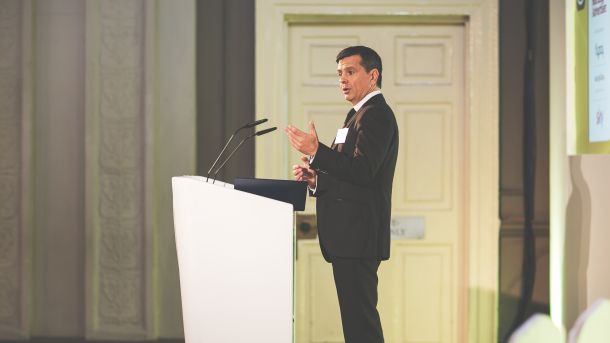
Support for the late-night levy
There is a ‘begrudging’ support for the late-night levy in Newcastle according to licensing expert Richard Arnot. Operators in the city are reluctantly embracing the controversial levy in the wake of falling crime statistics and an increased police presence on the streets, Arnot said. “Police are now highly visible and that’s a good thing across the board — it is good for the police, it’s good for the trade and it’s good for customers.” Money raised from the levy has paid for an extra 18 officers, as well as improved CCTV cameras and new thermal imaging cameras. Although Arnot admitted he was initially sceptical about the role, street pastors have emerged as one of the policy’s major successes.
The trained volunteers, who are drawn from local churches and patrol the streets late at night, have proved extremely useful in dealing with vulnerable people.
However, Arnot stressed that in order to work, levies must be run in a spirit of co-operation between police, council and operators, something other cities have so far failed to do.

Panel session: Why Newcastle?
New World Trading Company, Tiger Hornsby and Tokyo Industries
This session of the MA300 operators panel saw three of Newcastle’s leading lights discuss the highs and lows of operating in a city famed for its party atmosphere.
The panel consisted of New World Trading Company’s Chris Hill, Tiger Hornsby owner Rachael Frame and Tokyo Industries’ Aaron Mellor, all of whom are causing a stir in the north-east. Asked why she chose to operate in Newcastle, Frame said: “I was working for Diageo as their luxury events manager and was getting to see lots of trendy accounts. When I was coming home to see family in the city, I noticed there was a good opportunity for somewhere for the 30-plus crowds who are willing to spend more on an enhanced experience.”
For Chris Hill, the city was on the group’s hit list after achieving success in Leeds. “People in Newcastle are educated about food and drink and we knew that if we could put on a quality offer with good service we could do well.” Tokyo Industries Aaron Mellor said Newcastle’s Geordie Shore reputation undermined the city’s good characteristics. All three agreed that the city’s growing popularity would bring fresh challenges for operators looking to stand out from the crowd.
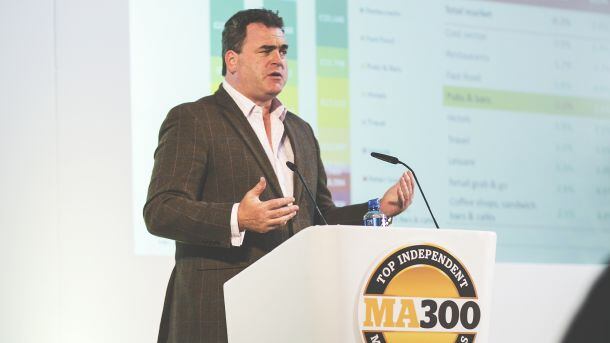
Reclaiming the ‘third space’
M&C Allegra Foodservice chief executive Simon Stenning urged pubs to reclaim the ‘third space’, a place between work and home which has previously been dominated by coffee shops. He pointed to the extremely successful café/bar chain Loungers as a leading example of the new style of pub.Pubs had lost their mojo, but by reinventing themselves and embracing hybridisation the future is looking brighter, Stenning said.
He added that the trade has an ace up its sleeve in the post-recession landscape. Value is still critical to consumers, and as pubs are not perceived as expensive, there is an opportunity for pubs to make the most of money-conscious consumers. Despite the recession’s legacy, research from M&C Allegra has found things are looking rosier for the economy overall.
The average worker now has £190 of disposable income to spend each week, and inflation is at an all-time low. The UK’s ageing population could also be good news for the trade, as older consumers are more familiar with pubs. However, Stenning added, it is the often fickle millennial group (those aged 18-35) who are driving growth and eating out more.

The quest for perfection
Oakman Inn’s founder and CEO Peter Borg-Neal is part of an elusive club of operators who have won three Publican awards. However, one award has evaded the group so far: Best Food Offer. Borg-Neal explained the advantages of entering awards for operators, even if they don’t end up lifting the trophy on the night. “It provides a boost for team morale and proves to them that they’re working for the right company.
It’s also free consulting for your business.” Looking at other winning businesses, Borg-Neal had seen that many employed an executive chef and decided to do the same, something he admitted should have been done sooner. Seeing the innovative food offers from other operators also inspired him to get creative and look to street food stalls and festivals for new ideas.
“It’s important to follow what’s going on elsewhere. Street food shows how to do one thing brilliantly. Consumers now are less interested in fussiness. It’s not about white tableclothes any more but about fantastic food.” Borg-Neal explained how effective the group’s Facebook group, Oakman Connect, has proved. Chefs from around the company post dishes on the page, as well as potential drink pairings for the meal.
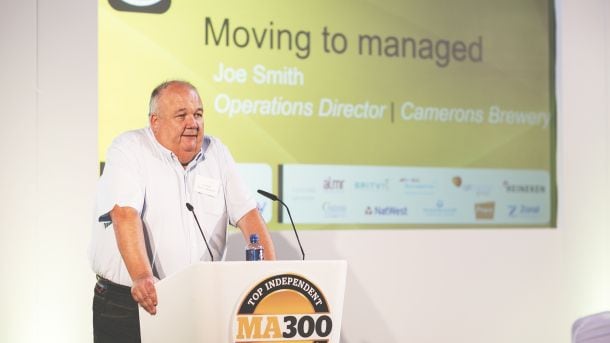
Moving to managed
Having just purchased north-eastern powerhouse brand Head of Steam, Camerons Brewery operations director Joe Smith discussed some of the challenges involved in integrating two businesses. Faced with a business that had previously run with little structure, becoming more corporate while maintaining an edge had been one of the major challenges faced by the brewery and pub company, Smith said.
He also urged operators to rethink their relationships with tenants. “We need to change the relationship between pub companies and their tenants. We’re quick to put our arms around them when things are going well but if they go wrong, it’s all their fault. That’s something that has to change. Obviously we’re looking for a return on our investments, but it has to be realistic. Understanding tenants and how hard they work is important.” Smith also highlighted the many positives for operators of hiring from within; Camerons is starting to reap the benefits of promoting staff from their existing pubs. Getting good people in and keeping them is key to the success of multiple-site operators, he added.
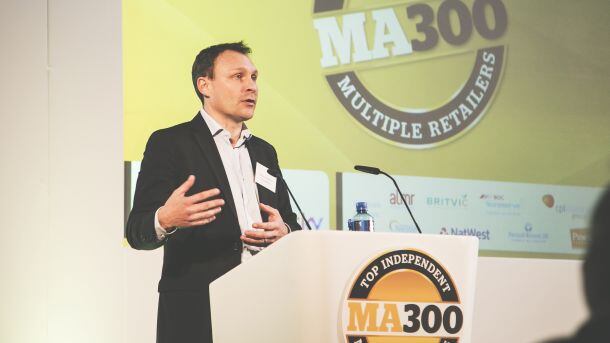
Accentuate the positive
The best weapon for dealing with online reviews is positivity, TripAdvisor’s Gwenael Merlin told operators. He reminded MA300 delegates to always thank people for their feedback (even if it’s bad), respond promptly, highlight the positive and to always invite customers back to see the business at its best. “It’s more about how venues address the problem than the fact there is a problem.
Operators who do everything they can to deal with a problem quickly and politely receive much better feedback. Dealing with issues as they happen can mitigate and defuse bad reviews and stop things escalating.”
He dismissed the idea that TripAdvisor is filled with bad reviews, adding that almost 50% of the reviews posted are positive, and the average review score is 4.12. With 400 million people now using TripAdvisor, getting on top of online reviews is more important than ever for operators, he pointed out. Almost 60% of users like to read six or more reviews before visiting a venue, and 82% trust what they read on the site, compared with the 46% who trust Facebook, he said.

Embrace technology
The trade needs to think more carefully about how it uses technology according to Zonal’s Clive Consterdine and FlyPay’s Chris Evans.
Discussing how best to use technology, Consterdine said: “Guests are far more savvy and do far more research before going out. More than half will check a venue’s website before visiting.” The pair warned of some of the traps multiple-site operators can fall into online, including not making websites optimised for mobile phones and posting inaccurate menus.
Research from Zonal shows half of 18 to 24-year-olds are ready to use their mobile to pay, and that paying is widely considered the most painful part of eating out. Evans highlighted some of the current security issues around bar tabs, including one memorable incident in a pub where his card was put with 10 others, with the details on full display to everyone waiting at the bar. He said by using better technology and apps, security can be increased and payment will be smoother for operators and consumers alike.

TripAdvisor, Zonal, Sky and Fly Pay
Hosted by PMA web editor James Evison, representatives from TripAdvisor, Zonal, Fly Pay and Sky discussed how operators can make the most of their businesses online. When asked whether it was appropriate for bar staff to be manning social media accounts, TripAdvisor’s Gwenael Merlin said it was important to brief and properly train staff to ensure everyone is speaking with one voice.
However, Consterdine warned: “People have to get smarter about how they handle their social media.” Operators were advised that if they were looking to create their own apps, they had to be more creative than just putting their existing websites into app form. FlyPay’s Chris Evans said: “Apps need to have something that’s functional. They need to offer value to your customer if you want them to use it.” He added that digital offers need to be carefully tailored to avoid annoying and alienating potential customers. Sky’s Martin Rogers rounded off the day by urging operators to “apply your own consumer filter to what you do as a business”.
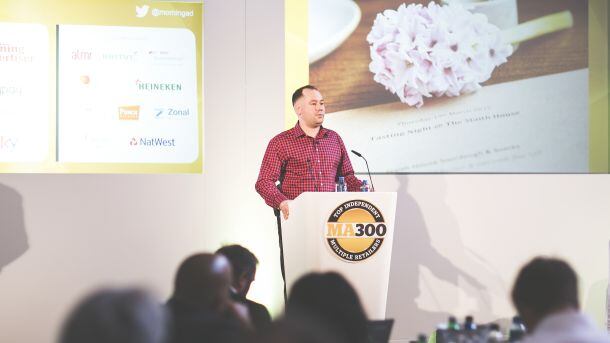
Food pub of the year: local is best
Fresh from victory at the Great British Pub Awards, Staith House chef-patron and former MasterChef: The Professionals finalist John Calton highlighted the benefits of local produce. “One of the reasons we have been successful and been able to go from strength to strength is because of how we source the food we use. We do our own smoking and a lot of charcuterie and we make our own dairy, such as butter. We also keep going away to work in other places to get inspiration.” Calton echoed Russell Allen’s thoughts that the more local the product is, the better it is likely to be.
“People like to know where their food has come from and they like to label the producer. For that reason, we always like to go local and spend as much on our produce as we can. There’s less mileage used to transport it to the pub and it tastes better. “From getting fish locally from the quayside in North Shields, to vegetables from local growers and game from a contact in Northumberland, we always try to get produce that’s as local as possible.”
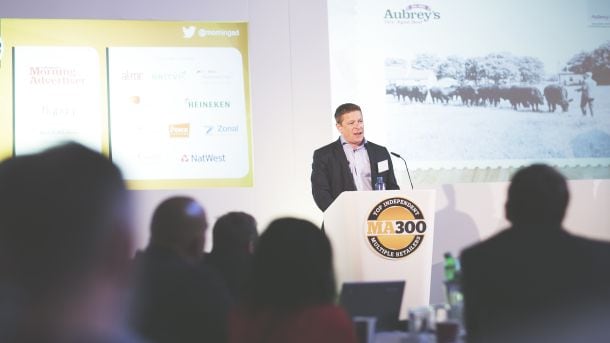
Stop the culture of imported meat
Leading butcher and meat supplier to pubs and restaurants across the country Russell Allen, of Aubrey Allen, discussed the raft of changes that have occurred within the meat industry in the past few years and maintained that cuts that would have been thrown away 10 years ago are now extremely popular.
Allen urged publicans and chefs to work more closely with their suppliers in order to develop their menus and told operators: “Focus on alternative beef cuts, not just steaks. It will delight customers and increase your margins.” Pubs were also told to stop focussing on the question of which cuts were cheapest, but to think instead about what would best enhance their menus and drive forward their businesses. Allen — who, in addition to a whole raft of quality food operations around the UK, supplies meat to the royal households — said that British steaks were among some of the very best in the world and stressed that local produce tends to taste far better than imported alternatives. He also urged UK pub operators to source more British meat or face soaring prices as demand for meat outstrips supply.
